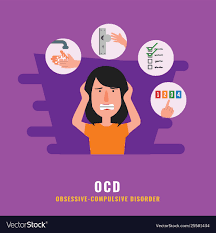OBSESIVE COMPULSIVE DISORDER
Double-checking things is a pretty common human behavior, like did I shut the garage door? Better double-check. How about locking the front door Double-check. Gas-stove and oven off? Double-check. We all do it. But what if you feel compelled to triple-check it, or even quadruple check it, or quintuple check it even, then it might be considered an obsession. Now, what if you have to do a certain ritual with the gas stove and oven before leaving the home each time, like: make sure the gas stove is off, wipe down the gas stove to clean it, double-check that the burners are off, make sure the oven is off, wipe down the oven to clean it, and then open the oven door to make sure no heat is coming out, and then leave the house. Then that might be a compulsion.
What is OCD?
Obsessive-compulsive disorder, or OCD, is a specific type of anxiety disorder characterized by these obsessions or compulsions. Obsessions are recurrent and intrusive thoughts that are typically unwanted and tough to get out of your brain. These unwanted thoughts like “my house are unsafe”, cause anxiety, and usually they they lead to compulsions, which are actions that might be performed to try and reduce the anxiety associated with obsessions. As you might imagine, these thoughts and rituals can have a serious impact on someone’s daily life. OCD affects around 3% of the population and affects both men and women equally and usually starts in childhood or the teen years. Celebrities like David Beckham and Howie Mandel are known to be affected by OCD, and a more a severe example is that of Howard Hughes, business tycoon, and entrepreneur, among other things, who was affected by relatively incapacitating OCD later in his life?
Obsession and compulsion
Although obsessive-compulsive includes both obsessions and compulsions, one doesn’t need both obsessions and compulsions for a diagnosis, some individuals might have just obsessions, or just compulsions, but the majority of patients have both, often where the compulsion is performed to alleviate an obsession. A very common compulsion is cleaning, which often stems from an obsession with germs or contamination. Another common compulsion is checking, usually because they have obsessions that something’s unsafe, so they’ll check to make sure that something’s locked by unlocking and re-locking, sometimes several times. More generally, repeating is a compulsion on its own, where an action or phrase is repeated several times, and usually this is done because if it’s not, they think something bad will happen. Sometimes patients might feel compelled to order and arrange things, because when they’re out of order, it causes anxiety and discomfort. Finally, mental rituals are also obsessions, these are often done to try and neutralize intrusive or what they think are bad thoughts. So they might try and call up specific words or phrases they think are good thoughts to try and replace the bad thoughts.
Criteria
Now the diagnostic and statistical manual for mental disorders, the fifth edition, or the DSM - V gives specific diagnostic criteria to meet for a diagnosis of OCD.
- First and foremost, they need to have the presence of obsessions, compulsions, or both.
- The obsessions and/or compulsions need to also be time-consuming, often such that it produces distress with their social and work life, for example, taking two hours per day folding and unfolding clothes and then being late for work.
- It’s also important that the obsessions and compulsions are not due to the physiological effects of a substance or another medical condition.
- Finally, the apparent anxiety isn’t better explained by another mental disorder, like for example, an obsession with a personal appearance like dysmorphic disorder.
Factors
- Like most mental disorders, there isn’t a known cause of OCD, though it’s thought to be a combination of genetic and environmental factors.
- Sometimes OCD seems to run in families, and an important clue is that identical twin are more often affected than non-identical twins.
- It’s now thought that abnormalities in serotonin neurotransmission in the brain play a key the role, though the exact mechanism is unknown.
Treatement
- Treatment usually involves psychotherapy, medications, or both.
- Among psychotherapy options, cognitive behavior therapy has been effective, specifically a technique called exposure and response therapy, where patients are first exposed to the anxiety and compulsion-provoking situation; ultimately showing that the anxiety lessons when the compulsion is not carried out.
- If the cause has been linked to serotonin, selective serotonin uptake inhibitors, or SSRIs are an effective drug treatment, though they often come with symptoms and side effects that may need to be further treated with medications or psychotherapy. With the right treatment, patients often return to normal daily life and activities.




This blog was very helpful in knowing everything about OCD..
ReplyDeleteThank you so much for sharing all this wonderful Info..😊
This blog is very knowledgeable and it looks interesting thanks for sharing this information with your audience
ReplyDeleteThis blog is informative .. and thnks for sharing about OCD .. and i never knew about this disorder ...and the treatment..
ReplyDelete